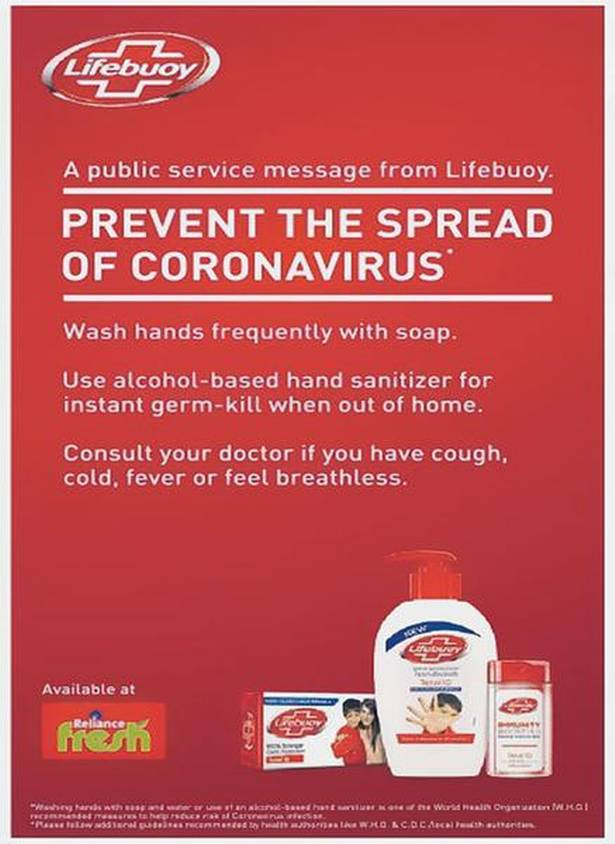As the Corona crisis took over the world, several brands pulled back their advertising and marketing efforts. While some feared that marketing campaigns could earn backlash against the brand, some just didn’t know to say.
So, should brands communicate? Should they communicate at all?
A 12-market study (12,000 people were interviewed across countries by PR company Edelman) on what role customers expected brands to play reveals some interesting points.
- Customers want brands to act responsibly, take care of their employees, and not aim to reap benefit from the crisis.
- Respondents wanted brands only to speak about their products after knowing how people’s lives are getting impacted by the crisis.
- Several said they wanted brands to make a difference during the hour of crisis by helping the community and bringing everyone together. Brands, they felt, should use their power to educate and inform.
- Everyone wanted to hear from the brands they associate with, but was expecting messaging that had empathy for the struggles that were being faced.
Having said that, this crisis is a great opportunity for brands to talk to their customers. It’s a moment for them to prove that humanity comes before profits.
While many brands did end up losing this golden opportunity by putting the proverbial foot in the mouth, others have really been able to build an amazing crisis communication strategy.
Here are some brands that have really aced their messaging and communication at this time of crisis:
Pidilite
Pidilite’s Fevicol has been acing its social media game for a while. This simple but powerful creative said it all. It kept the seriousness of the situation and the messaging about social distancing at the forefront, but the brand imagery and their core brand messaging is also integrated beautifully.
Social distancing made simple #corona #FevicolKaJod #MazbootJod
This, by the way, isn’t the first time that Pidilite has created such creatives on topical issues. From the Mumbai rains to Brexit to Game of Thrones, Fevicol social media channels have been buzzing with fun, quirky takes that sometimes incorporate important messages.
Lifebuoy
In times of crisis, innovative messaging is great but it’s even better if it’s backed by some on-ground action. And that’s exactly what Lifebuoy has done so well. For many years now, Lifebuoy’s brand messaging has centred around the importance of washing your hands, so their Corona campaign was simple yet effective.
However, it’s not just the messaging that Lifebuoy did so effectively. They have actually partnered with PayTM on a crowdfunding campaign to get people to donate sanitizers and soaps to domestic workers, migrant labour, and other disadvantaged sections of society. During the Corona Crisis, it’s not just about innovative messaging, brands have to be ready to back their words with action.
Zomato
Zomato is another brand that has really got its crisis communications plan in place. The brand has set up an initiative to provide free meals to migrant workers and daily wage labourers as India goes through its 21-day lockdown. What’s more, it also has an option on the app where (if you’re practising social distancing), you can request your delivery rider to leave your food outside the door instead of handing it to you. Now that’s what we call some next level crisis communication strategy! Once again, this has worked so well because Zomato has been unafraid to put its money where its mouth is.
TravelBlue
Travel Blue is a travel accessories brand that provided over 2000 N90 face masks to travel retail partner Flemingo. This helped Flemingo protect airport staff against the COVID-19 across airports in India Mumbai Duty-Free, Go Duty-Free, and the Duty-Free Galleria stores in Delhi and Bangalore all received these masks. Once again, measures like these go a long way in building brand goodwill at a time when the world is grappling with so much panic and uncertainty.
Amul
When it comes to topical content, few can nail it like Amul. This time too the brand’s simple yet effective copy brought home the strong and powerful message of hygiene and social distancing.
#Amul Topical: Precautions against the Coronavirus!
Read also: Content Marketing During the Times of Crisis
What can we learn from these brands?
There’s a lot that marketers can learn from brands at this time of Corona crisis — both in terms of what to do as well as what not to do. Here are some of our key takeaways:
Be mindful of the situation
People are grappling with an unprecedented situation — and it’s likely to constantly play at the back of their mind. This doesn’t mean that you only need to create content and messaging around COVID-19, but it does mean that you have to address the crazy reality of the moment. Even if you’re putting out a regular story, it’s a good idea to mention the pandemic and the current situation first.
Back words with actions
This is something that every brand that’s nailing their communication strategy at this point is doing. Any number of brands are sending emails to their customers saying “We are with you during this tough time”, but that isn’t enough. Not by far.
You can either make a donation to a worthy cause, organize a cause yourself or even provide some extra value to customers during this period. People will always remember how brands valued and supported them at this juncture so it’s very crucial to get this right.
Avoid fear-mongering
This one is an absolute must. You have to realize that people are suffering from all kinds of stress and anxiety at the moment — whether it’s about their job, their emotional well-being, or the health of their loved ones. Any brand messaging that comes out at this stage should be thoroughly fact-checked and big on information accuracy. Just as important, it shouldn’t send a message that causes more fear and panic in the minds of readers. It’s time to step away from click-bait headlines and anxiety-inducing content. People may click on the content and consume it now, but in the long run it will destroy your goodwill and brand loyalty.
Read also – 8 Things You Can Do Today to Protect Your Business from Coronavirus
The bottom line
The current pandemic is a unique opportunity for brands to stand out in the crowd through compassionate, empathetic and innovative messaging. The consumer wants to know that the brands they buy from understand their pain and are willing to put people before profits.
The Edelman report found that 37% of respondents had decided to switch to a new brand, as a result of how the brand had been communicating during the crisis.
So yes, there is much higher risk involved with any sort of brand communication at this moment, but at the same time, you risk losing your consumer loyalty but keeping quiet or saying the wrong thing.
There are two choices for brands at this time — they can either operate from a place of fear and anxiety themselves or they can step up and send a message of empathy, concern, and compassion to their audience. Remember, how you communicate now can define how your consumer will behave with your brand long after this period is gone.







